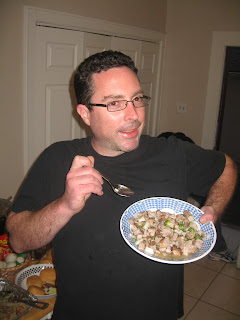Food and Oral History: Balut
 |
| My sister shows off her contribution to the Merienda. |
The mysterious delicacy I build up here is the legendary balut. According to Wikipedia, a balut is a fertilized duck (or chicken) egg with a nearly-developed embryo inside that is boiled alive and eaten in the shell.
Popularly believed to be an aphrodisiac and considered a high-protein, hearty snack, balut are mostly sold by street vendors in the regions where they are available. It is commonly sold as streetfood in the Philippines. The Filipino and Malay word balut (balot) means "wrapped" – depending on pronunciation.
When I was first offered the egg, it was half peeled and half hatched. I saw what appeared to be a fetal chic inside. I was not easily swayed away from exotic food. I was a very trusting child. If my father offered food to me that he ate himself, it must not be bad. This was my logic of childhood.
 |
| Our friend Jay, gets ready to bite into the balut. |
I bit into the eggy creature and to my delight, it tasted good. It tasted very much like a very chicken-y egg. As long as you are not really looking in the eye of the premature creature, and you are drunk and hungry, then this tasty appetizer is for you.
I write in appreciation of the memory. This story ties into the Merienda where all these dishes intersected. Many brought a dish to share, a dish they slaved over in the kitchen. My sister, on the other hand, was very busy and did not have time to cook. Instead of cooking she brought Filipino garlic corn nuts and a basket of eggs, aka balut.
As children we have the most striking memories of balut. I think I recall one of my siblings crying after being lambasted for not eating the pre-hatchling. As a matter of fact, my own father chided any new stranger, with the balut test. If any American came to the house claiming any Filipino street cred, he would always challenge them. "Oh yeah? Have you tried balut?"
My dad and his brothers challenged my husband as he prided himself to the rite of passage to drink beer in the garage with them. "Do you even know what balut is?" They would harmoniously ask with anticipation of an already mischievous and negative answer in their eyes. It was if they were going to pull one out of their back pocket and make him eat one right on the spot. Your response was always critical at that moment. If you did not know what balut was, instant dismay. If you slinked away in disgust while they described balut to you, denied.
At the party, my sister brought the eggs. The elders eyeballed the basket, waiting for their chance to discreetly eat the baluts. My aunt finally cracked into one of the eggs, only to find to her disappointment that the egg was not cooked! She was not even horrified though, just fully poised in her critique. I looked immediately to my sister. "Well I did not know I needed to cook them. That is why you had this party, right? So we can learn this stuff," she said with raised eyebrows and big eyeballs while looking at me.
Immediately, my mother and aunts gathered around the stove to quickly boil the eggs. Everyone debated on the time. We settled on twenty minutes to boil the balut after someone checked one of the eggs too early and found a wet yolk-ish surprise. "Oh, okay, I guess you were right. Twenty minutes." You know it is ready if the egg is hard-boiled.
So how do you eat balut? I have observed that you hold the egg right side up and crack the top, peel it open and bite into the yolkish part. Disregard the half-hatched fetus, unless you are hard core - then enjoy.
I do not know how many eggs there were. I only know that eventually they were all consumed and I think towards the end of the evening a few were eaten after some tipsy daring.
 |
| My brother does not quite remember this moment. |
Note: Now, as for the corn nuts, if you have not had Filipino garlic corn nuts, you must know that it is impossible to not completely empty the bag after first consuming your first piece of salty, roasted garlic cracklins. You can pick this up at any Asian grocery store. If it is truly Filipino it should have the word "bawang" on the outside (means garlic). I have seen some corn nut packages with the picture of a comical garlic character throwing a punch. That probably best portrays the flavor. My husband brought a bag to work once and his coworkers consumed the entire thing without thinking or stopping.
References:
Wikipedia - definition and photo of balut: http://en.wikipedia.org/wiki/Balut_(egg)



Comments
Post a Comment